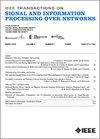基于信任增强分布式卡尔曼滤波的传感器网络故障诊断
IF 3
3区 计算机科学
Q2 ENGINEERING, ELECTRICAL & ELECTRONIC
IEEE Transactions on Signal and Information Processing over Networks
Pub Date : 2025-09-04
DOI:10.1109/TSIPN.2025.3606167
引用次数: 0
摘要
传感器故障诊断是传感器网络中的一个关键问题,因为传感器故障会导致数据融合和状态估计的严重误差。为了解决这一挑战,我们提出了一种增强信任的分布式卡尔曼滤波器(TeDKF),旨在提高传感器故障下SNs的状态估计性能。TeDKF框架在分布式扩散卡尔曼滤波(DDKF)结构中加入了一种新的基于增量密度(IDB)的聚类机制,该机制可以支持中级特征(创新)交换并有效融合可靠的传感器节点。与传统的集群方案不同,IDB集群不依赖于多数投票,多数投票中必须有一半以上的节点是可靠的。相反,即使在大多数节点受到损害的情况下,它也可以有效地检测和消除故障传感器。这种动态聚类通过基于正常系统行为的演化对可靠节点进行选择性分组来建立信任,这被认为是检测异常和隔离故障传感器的动态信任参考,而不受多数投票的影响。实验结果表明,与传统的卡尔曼滤波技术相比,TeDKF显著降低了估计误差,提高了容错性。它可以处理不同的传感器故障,如偏置、漂移、噪声和卡故障,特别是在大多数节点故障的情况下。本文章由计算机程序翻译,如有差异,请以英文原文为准。
Trust-Enhanced Distributed Kalman Filtering for Sensor Fault Diagnosis in Sensor Networks
Sensor fault diagnosis is a critical issue in Sensor Networks (SNs) since sensor failures could lead to significant errors in data fusion and state estimation. To address this challenge, we propose a trust-enhanced distributed Kalman filter (TeDKF) designed to improve the state estimation performance of SNs under sensor faults. The TeDKF framework incorporates a novel incremental density-based (IDB) clustering mechanism into the distributed diffusion Kalman filter (DDKF) structure, which can support an intermediate-level feature (innovations) exchange and effectively fuses reliable sensor nodes. Unlike conventional clustering schemes, IDB clustering does not rely on majority voting, where more than half of the nodes must be reliable. Instead, it can effectively detect and eliminate faulty sensors even in scenarios where the majority of nodes are compromised. This dynamic clustering builds-up trust by selectively grouping the reliable nodes based on evolving normal system behavior, which is considered as a dynamic trust reference to detect anomalies and isolate faulty sensors irrespective of majority voting. The experimental results show that TeDKF significantly reduces estimation errors and enhances fault tolerance compared to the traditional Kalman filtering technique. It can handle different sensor faults, like bias, drift, noise, and stuck faults, especially in scenarios where most nodes are faulty.
求助全文
通过发布文献求助,成功后即可免费获取论文全文。
去求助
来源期刊

IEEE Transactions on Signal and Information Processing over Networks
Computer Science-Computer Networks and Communications
CiteScore
5.80
自引率
12.50%
发文量
56
期刊介绍:
The IEEE Transactions on Signal and Information Processing over Networks publishes high-quality papers that extend the classical notions of processing of signals defined over vector spaces (e.g. time and space) to processing of signals and information (data) defined over networks, potentially dynamically varying. In signal processing over networks, the topology of the network may define structural relationships in the data, or may constrain processing of the data. Topics include distributed algorithms for filtering, detection, estimation, adaptation and learning, model selection, data fusion, and diffusion or evolution of information over such networks, and applications of distributed signal processing.
 求助内容:
求助内容: 应助结果提醒方式:
应助结果提醒方式:


